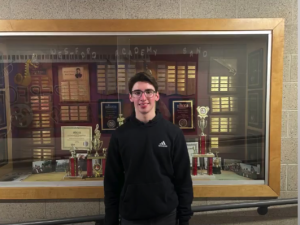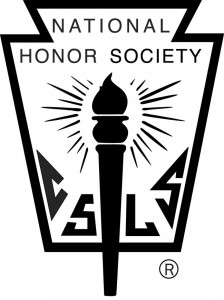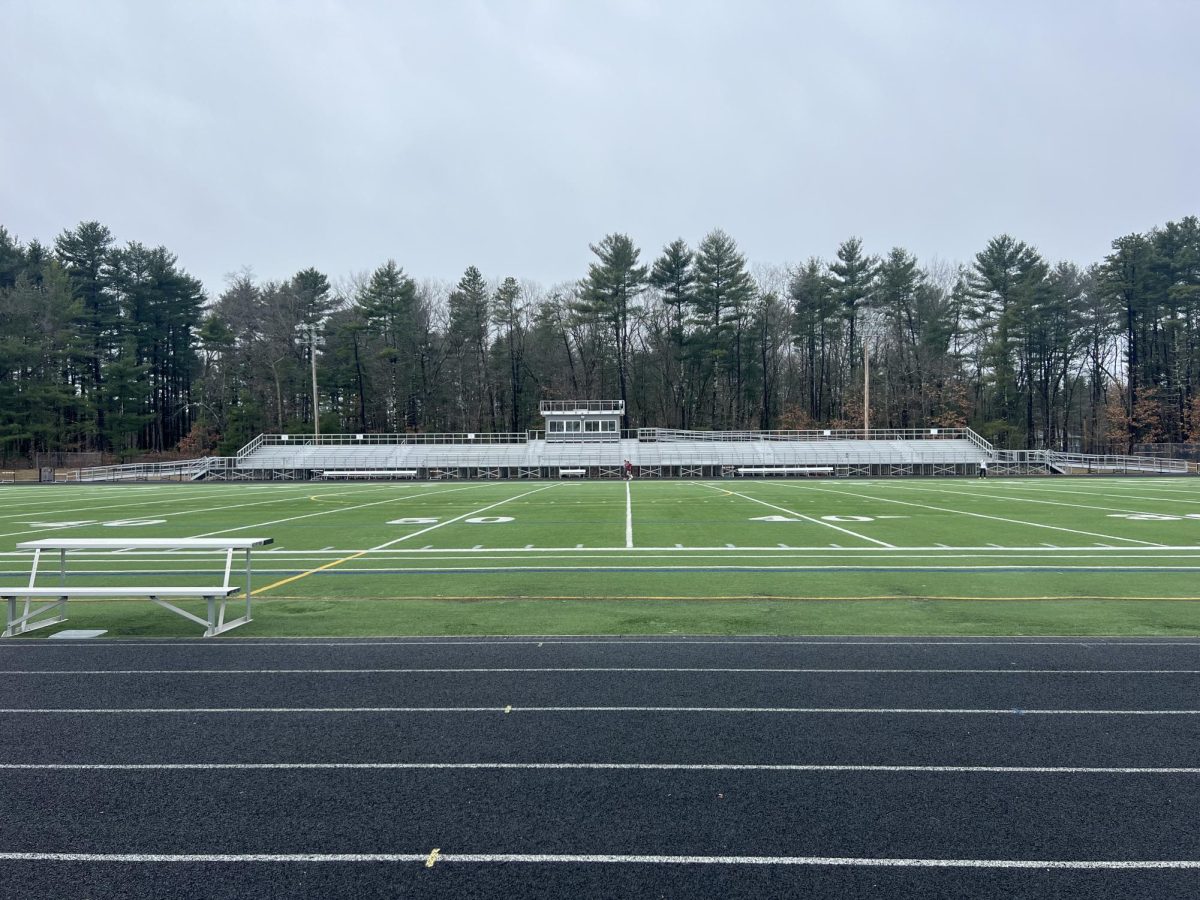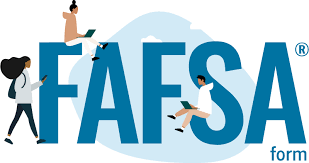The National Honor Society (NHS) is a nationwide organization founded in 1921. Admission into the club is based on the four pillars of NHS: scholarship, leadership, service, and character. Their logo, as shown on the right, features a bright, flaming torch. Over the last few years, the Tadmuck Chapter of the National Honor Society has seen that torch slowly fade away for various reasons.
The first declining area for NHS is the trend in fundraising over recent years. So far this year, NHS has raised $410 for charity via the Bazaar and Bake Sale, according to statistics provided by the advisors. With more than half of the year over, the Society is still planning on additional fundraisers through ultimate frisbee and dodgeball tournaments.
Even with two upcoming events, fundraising efforts still look gloomy and are often addressed cynically by many members. It is highly doubtful that ultimate frisbee can maintain anywhere near the fundraising levels from previous dances due to its certain amount of appeal to the student body. As far as dodgeball goes, last year the Dodgeball Committee was hampered by poor leadership and planning which led to the event never actually happening.
These numbers become even more surprising when compared against the fundraising efforts of the previous years. Last year, $1,925 was donated to the American Cancer Society (ACS) and One Fund Boston. In 2011-12, $1,350 was raised for ACS and Doctors without Borders. Fundraising efforts from the two years combined also helped raise an additional $1000, not counted in the above figures.
Perhaps the greatest success of NHS came in the 2010-11 school year. $5,427 was donated with $1,270 to ACS, $204 for Women for Women International, $3553 for relief efforts in Haiti, and $450 for Japan relief efforts. With a wide variety of events including selling daffodils, a run, the bazaar, the dance, and a donation drive, there is a stark difference between what NHS has been and what it is now.
All this begs the question: why has fundraising decreased by more than 1000% from $5,427 three years ago to currently $410 with more than half the school year completed? The main reasons given by advisor Heather Tedesco are the elimination of the dance and ACS’ daffodil sales.The ACS announced that 2013 was the final year for daffodil sales, as the program “is no longer possible to sustain” due to the limited nationwide participation, according to ACS’ website. Over the past three years, NHS has raised over $4,000 for ACS.
But the lack of two fundraisers should not be enough to virtually cripple a society’s efforts. Take WA’s business club DECA, for example. DECA also held a profitable dance and has been able to adapt with innovative new fundraisers, such as the recent mattress fundraiser. DECA has been able to take risks and attempt nontraditional fundraisers, while NHS has not just stagnated but declined. As loopy as a mattress fundraiser sounds, DECA cleared approximately $3,600 for the club according to DECA President Abby Ciancolo.
Tedesco also points to the structure of NHS as a reason for the failure of the dodgeball fundraiser last year to go along with “last minute” and “less than necessary” planning. “It’s a bit of a bureaucracy here, we got a number of different chairs doing different committees,” says Tedesco.
Tedesco also added that it is important to note that she believes that students and advisors have learned from NHS’ mistakes and are ready to move forward. She anticipates a more successful dodgeball tournament for this year.
Turning Around NHS: Summary
NHS has its flaws. That is undeniable. The question that needs to be addressed that has been successfully ignored during NHS monthly meetings is how does NHS buck this trend? Here is my own plan for the road back to prominence for NHS.
First and most important, NHS needs to change the way their objectives are prioritized. When asked what the goal of NHS is, Tedesco replied by first stating that it is “to recognize individuals who stand out who are outstanding students” and demonstrate the four pillars. When prompted about community service, Tedesco stated that NHS “promotes community service by allowing opportunities for our members to participate in.”
If NHS wants to become a better organization, these goals must be flipped. Helping others should be priority one before we help ourselves. The only way to make such an empirical change to the mission of the club is to take smaller, yet still significant, steps in the right direction.
Step 1: Fix the Financials
Currently, NHS annually spends approximately $1,000 to $2,000 on the induction ceremony and $500 on scholarships for its own members. Combine that with the approximate value of $3,000 the Trustees of WA spend on books for graduating NHS seniors These numbers, which total to $4,500 to $5,500 every year, make the current figure of $410 to charity seem shamefully small.
By allowing the Trustees to spend approximately $3,000 every single year to give books to Westford students that, more likely than not, are in a comfortable financial situation, NHS is carrying on a tradition that reeks of privilege. Most schools are not lucky enough to have a generous Board of Trustees. In the spirit of community service and helping others, I challenge NHS to carry on the lovely tradition of giving books but make the benefactors people in need. Choose a high school every year that has a tight financial situation, where an event like this would be unthinkable, and give a book to each member of their NHS chapter.
Scholarships can be fixed in the same way. Currently, two $250 scholarships are awarded to WA NHS members every year. Financial need is, paradoxically, not a required criteria for selection to receive a scholarship that helps finance higher education. Making matters worse, there is sizable apathy towards these scholarships at WA. Tedesco notes that two years ago, NHS received only two applications for the two scholarships.
I see two great options on how to use this $500 every year. One route is to abolish the scholarships and give it to charity, considering that is more money than the entire chapter has raised so far this year. The second way, which would carry on the tradition and ideals behind the scholarship, is to open up the scholarship to either all of Westford Academy or all of Middlesex County. Have financial need act as an important factor in selection along with the demonstration of the four pillars of NHS. Not only would applications increase, but the scholarships would have a better chance of ending up in the hands of someone that truly needs the money to continue their education.
Finally, we have the elaborate induction ceremony. After numerous attempts at obtaining detailed records on the costs of the ceremony, the best estimate we received from the advisors was a cost between $1000-$2000. I advise the Society to take a closer look at how that money is actually spent. The induction ceremony should still happen, but if the cost can be reduced by even just 10-20%, that would be more money available for charities.
To make these changes happen, NHS needs to more effectively use their eight members in leadership positions. Each should be given one of these responsibilities to carry out. One board member in charge of coordinating the book donation with another high school, one for deciding on scholarship recipients, and one for cutting costs on the induction ceremony. This gives real responsibility on the students to make sure these changes happen successfully, with accountability riding on one of the elected leaders of the Society.
Step 2: Reform Community Service Projects
After NHS gets its finances in better shape, reform must be brought upon community service projects. As a member for three years, I can attest with firsthand experience of how silly and trivial some of these events can be. If a member does not want to do actual work they do not have to. Over my three years, the only community service I have done through NHS has been the Paper Crane Project and a used book drive.
While those sound like high-impact work, my actual contribution has taken about five minutes of my time each year. I folded a few paper cranes and brought in three used books from my house and handed them to someone. That is not NHS-level work and should not be tolerated. High expectations are lauded throughout the Society and that should not stop with community service projects. How are my low-level contributions considered equal to spending a day at a soup kitchen or raking and shoveling for senior citizens?
A common argument against adding additional levels of commitment for NHS members is that the students in the Society are already so busy with other activities and time commitments. That sounds like an excuse for laziness among its members, not the call of an honor society. If changing monthly service projects to become high-impact work that requires critical thinking causes the lazy and apathetic members of the club to leave, great. It is perplexing as to why NHS caters to these members, such as myself.
Contributions by Kyle Auger and Craig Brinkerhoff













